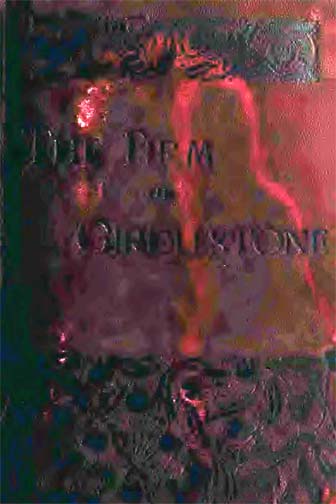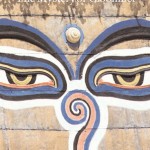
Fortune had been smiling upon the Bohemians of late. Ever since the major’s successful visit to Fenchurch Street he had been able to live in a state of luxury to which he had long been unaccustomed. His uncle, the earl, too, had condescended to think of his humble relative, and had made a small provision for him, which, with his other resources, removed all anxiety as to the future. Von Baumser had his fair share in this sudden accession of prosperity. The German had resumed his situation as commercial clerk and foreign correspondent to Eckermann & Co., so that his circumstances had also improved. The pair had even had some conversation as to the expediency of migrating into larger and more expensive lodgings, but the major’s increasing intimacy with his fair neighbour opposite stood in the way of a change. In any case, they were loth to leave their fourth floor, and to have the trouble of moving their effects.
These same effects were the pride of Major Clutterbuck’s heart. Small as their sanctum was, it was a very museum of curious objects brought from every part of the world, most of them of little intrinsic value, but all possessing a charm of association to their owner. They were his trophies of travel, battle, and the chase. From the bison rug and tiger skin upon the floor to the great Sumatran bat which hung head downwards, as in the days of its earthly existence, from the ceiling, there was not an object but had its own special history. In one corner was an Afghan matchlock, and a bundle of spears from the southern seas; in another a carved Indian paddle, a Kaffir assegai, and an American blowpipe, with its little sheaf of poisoned arrows. Here was a hookah, richly mounted, and with all due accessories, just as it was presented to the major twenty years before by a Mahommedan chieftain, and there was a high Mexican saddle on which he had ridden through the land of the Aztecs. There was not a square foot of the walls which was not adorned by knives, javelins, Malay kreeses, Chinese opium pipes, and such other trifles as old travellers gather round them. By the side of the fire rested the campaigner’s straight regulation sword in its dim sheath—all the dimmer because the companions occasionally used it as a poker when that instrument happened to be missing.
“It’s not the value of thim,” the major remarked, glancing round the apartment, “but, bedad, there’s not one of the lot that has not got a story tacked on to it. Look at that bear’s head now, that’s grinning at ye from over the door. That’s a Thibet bear, not much bigger than a Newfoundland dog, but as fierce as a grizzly. That’s the very one that clawed Charley Travers, of the 49th. Ged, he’d have been done for if I hadn’t got me Westley Richards to bear on him. ‘Duck man I duck!’ I cried, for they were so mixed that I couldn’t tell one from the other. He put his head down, and I caught the brute right between the eyes. Ye can see the track of the bullet on the bone.”
The major paused, and the pair smoked meditatively, for Baumser had returned from the City, and the twilight was falling and everything conduced to tobacco and reverie.
“See that necklace of cowrie shells hanging beside it,” continued the veteran, waving his cigarette in that direction; “that came from the neck of a Hottentot woman—a black Vanus, be Jove! We were trekking up country before the second Kaffir war. Made an appintment—could not go—orderly duty—so sent a trusty man to tell her. He was found next day with twenty assegais in his body. She was a decoy duck, bedad, and the whole thing a plant.”
“Mein Gott!” Von Baumser ejaculated. “What a life you have led! I have lived with you now many months and heard you tell many tales, but ever there are fresh ones.”
“Yes, a strange life,” answered the major, stretching out his gaitered legs and gazing up at the ceiling. I niver thought to be stranded in me ould age. If I hadn’t commuted I’d have had a fair pinsion, but I drew me money in a lump sum, and went to Monte Carlo to break the bank. Instead o’ that the bank broke me, and yet I believe me system was correct enough, and I must have won if I had had more capital.”
“There is many says dat,” grunted Von Baumser doubtfully.
“I believe it for all that,” the major continued. “Why, man, I was always the luckiest chap at cards. I depinded on me skill principally, but still I had luck as well. I remimber once being becalmed for a fortnight in the Bay of Biscay in a small transport. Skipper and I tried to kill time by playing nap, and we had the stakes low enough at first, but they soon grew higher, for he kept trying to cover his losses. Before the ind of the two weeks I cleared out of him nearly all he had in the world. ‘Look here, Clutterbuck,’ he said at last, looking mighty white about the gills, ‘this ship that we are in is more than half mine. I am chief owner. I’ll stake me share of the ship on the next game against all that I have lost.’ ‘Done!’ said I, and shuffled, cut, and dealt. He went four on three highest trumps, and an ace, and I held four small trumps. ‘It’s a bad job for my creditors,’ he said, as he threw his hand down. Ged! I started on that vyage a poor captain, and I came into port very fairly well off, and sailing in me own ship, too! What d’ye think of that?”
“Wunderbar!” ejaculated the German. “And the captain?”
“Brandy, and delirium tremens,” the major said, between the puffs of his cigarette. “Jumped overboard off Finisterre, on the homeward vyage. Shocking thing, gamblin’—when you lose.”
“Ach Gott! And those two knives upon the wall, the straight one and the one with the crook; is there a history about them?”
“An incident,” the major answered languidly. “Curious, but true. Saw it meself. In the Afghan war I was convoying supplies through the passes, when we were set upon by Afreedees, hillmen, and robbers. I had fifty men of the 27th Native Infantry under me, with a sergeant. Among the Afreedees was a thumping big chief, who stood among the rocks with that very knife in his hand, the long one, shouting insults at our fellows. Our sergeant was a smart little nigger, and this cheek set his blood up. Be jabers! he chucked his gun down, pulled out that curved dagger—a Ghoorkha knife it is—and made for the big hillman. Both sides stopped firing to see the two chaps fight. As our fellow came scrambling up over the rocks, the chief ran at him and thrust with all his stringth. Be jabers! I thought I saw the pint of the blade come out through the sergeant’s back. He managed to twist round though, so as to dodge it. At the same time he hit up from below, and the hillman sprang into the air, looking for all the world like one o’ those open sheep you see outside a butcher’s shop. He was ripped up from stomach to throat. The sight knocked all the fight out of the other spalpeens, and they took to their heels as hard as they could run. I took the dead man’s knife away, and the sergeant sold me his for a few rupees, so there they are. Not much to make a story of, but it was intheresting to see. I’d have bet five to three on the chief.”


